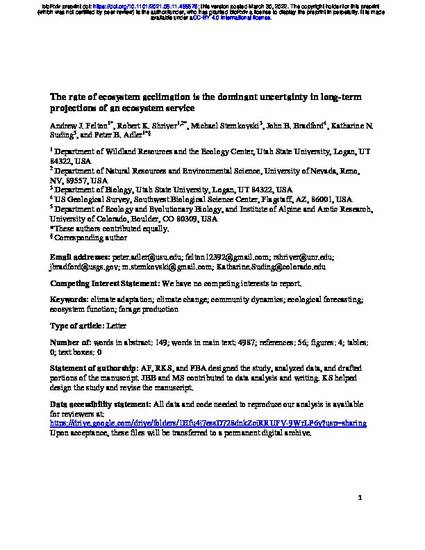
Article
Rate of ecosystem acclimation is the dominant uncertainty in long-term projections of an ecosystem service
bioRxiv
(2022)
Abstract
Rapid climate change may exceed ecosystems’ capacity to respond through processes including phenotypic plasticity, compositional turnover and evolutionary adaption. However, research predicting impacts of climate change on ecosystem services rarely consider this rate of “ecosystem acclimation.” Combining statistical models fit to historical climate data and remotely-sensed estimates of herbaceous productivity with an ensemble of climate models, we demonstrate that assumptions concerning acclimation rates are a dominant source of uncertainty: models assuming minimal acclimation project widespread decreases in forage production in the western US by 2100, while models assuming that acclimation keeps pace with climate change project widespread forage increases. Uncertainty related to ecosystem acclimation is larger than uncertainties from variation among climate models or emissions pathways. A better understanding of ecosystem acclimation is essential to improve long-term forecasts of ecosystem services, and shows that management to facilitate ecosystem acclimation may be necessary to maintain ecosystem services at historical baselines.
Disciplines
Publication Date
2022
DOI
https://doi.org/10.1101/2021.08.11.455579
Citation Information
Peter B. Adler. "Rate of ecosystem acclimation is the dominant uncertainty in long-term projections of an ecosystem service" bioRxiv (2022) Available at: http://works.bepress.com/peter_adler/269/
